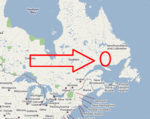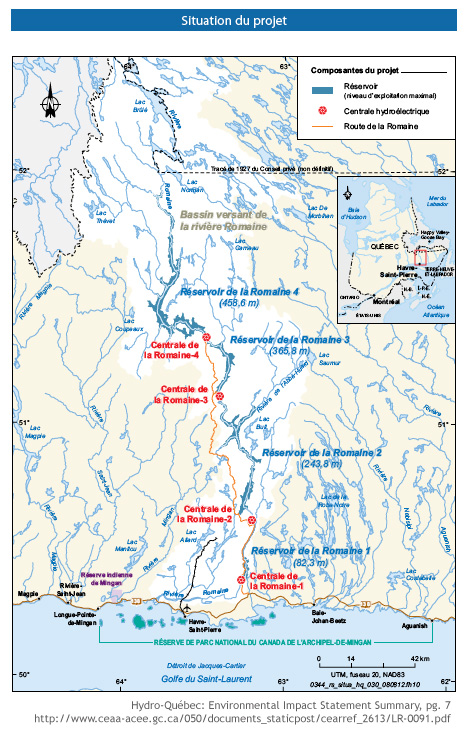

Quebec Innu wage battle to halt huge hydroelectric project
see also The Fifty Marathons Campaign
Marianne White
National Post
Friday, September 04, 2009
QUEBEC -- Nearly 40 years after Cree and Inuit won an injunction to stop the massive James Bay hydro project, an Innu community is waging a similar battle against Hydro-Quebec, the province and the federal government to halt another major hydroelectric project on Quebec's Lower North Shore.
The Innu of Uashat Mani-Utenam, near Sept-Iles, want a permanent injunction to stop the construction of the Romaine project, a $6.5-billion plan to build four dams along the Romaine River and produce 1,550-megawatts of power starting in 2020.
Last May, Premier Jean Charest announced the undertaking, which is among the largest infrastructure projects in Canada. Charest said the new project is crucial to secure Quebec's energy supply, but his government has made it clear any extra power will be offered for export to Ontario, Eastern Canada and the United States.
The province has signed agreements with some Innu communities regarding the Romaine project, but not with the Sept-Iles band that is ferociously opposed to it.
"It's an all-out fight against Hydro-Quebec and Canada, make no mistake about it," said the band's lawyer, James O'Reilly.
"Forty years ago, we attacked the first James Bay project. We were not bluffing then and we're not bluffing now," added the Montreal lawyer, who has represented native bands, including the James Bay Cree, for more than 40 years.
Mr. O'Reilly won an injunction in 1973 to stop the massive James Bay hydro project on grounds the Cree of northern Quebec had rights in the vast area where Hydro-Quebec had started building it.
That ruling led to the James Bay and Northern Quebec Agreement in 1975 and a cash settlement of $225-million to Cree and Inuit for giving up aboriginal claims to about half the territory of Quebec and clearing the way for the James Bay hydro project.
Since then, the Supreme Court of Canada has also established that Aboriginal peoples do have ancestral rights.
In documents filed with the Quebec Superior Court and the Federal Court, lawyers for the plaintiffs contend a huge portion of the Romaine project, notably the transmission lines, is going to be built on what they consider the backbone of their traditional Innu territory.
The native group says it has not been consulted nor given its consent to the project and the governments are infringing on their ancestral rights on the territory. The Innu add that the four dams will have negative impacts on the territory, the ecosystem and their way of life, notably their fishing and hunting traditions.
The native community is also asking the courts to force the provincial and federal governments to redo their environmental-assessment process of the project to include the construction of the transmission lines.
"We think we have a very good chance at stopping at least the construction of the transmission lines," Mr. O'Reilly said.
The action filed in Quebec Superior Court is against Hydro-Quebec, the Quebec environment minister, the Quebec attorney general and Canada's attorney general.
The Innu have filed two legal proceedings in Federal Court, one against the transport minister and another one against the environment minister and minister of fisheries and oceans.
Mr. O'Reilly noted the cases are being specially managed by a judge and that meetings are scheduled in the coming weeks.
He stressed the Innu have the right to ask at any time for an immediate and temporary injunction to block the project.
"For now we have decided not to resort to that, but our deadline expires at end of September," he said.
A spokeswoman for Hydro-Quebec said Friday the proceedings are "taking their course" and that the provincially owned agency has met several times with the plaintiffs to discuss the next steps.
The Fifty Marathons Campaign
Alliance RomaineRun for our Rivers
As a cornerstone of our political strategy, Alliance Romaine is launching an ambitious marathon campaign designed to physically and figuratively connect the fates of two separate rivers.
Starting in early September 2009, a team of volunteer athletes will run 42-kilometer relays on a route stretching from James Bay to the Lower North Shore.
The event will kick off at the spectacular Oatmeal Rapids, where the historic and soon-to-be diverted Rupert River crosses the James Bay Highway.
Embodying the traditional role of runner as messenger, the marathoners will transmit the experiences and disappointments of the James Bay Cree communities which have been impacted by forty years of aggressive hydroelectric development on their lands. As we run through the communities of southern and eastern Quebec, we will showcase the struggles of local activists who have fought to protect wild rivers including the Dumoine, the Magpie and the Moisie. We will hold seminars and public presentations to discuss energy strategy, and we will expose the cumulative loss to biodiversity, fisheries, and recreational and cultural values that is occasioned by a policy that involves damming the majority of Quebec’s large rivers.
Divided into a set of approximately fifty marathons, the event will span two thousand kilometers, and last five weeks, before concluding on traditional Innu territory at the spot where the now-threatened Romaine River flows into the St. Lawrence.
This campaign’s aim is to mobilize and give a voice to the large numbers of Quebecers who believe that our rivers should be valued as something more than potential treadmills to produce cheap energy.
Our demands:
1. A halt to the recently-initiated hydroelectric project on the Romaine River
2. A moratorium on hydroelectric dam development, including the Little Mecatina
3. Protected status for the full length of the Romaine River
4. Good-faith land title negotiations with First Nations
5. Adopt a conservation based energy strategy with full public accountability
6. End energy subsidies to big business
7. A system of government grants and incentives to support small-scale renewable energies
Energy for Export and the Romaine River Hydroelectric Complex in Québec
Posted by Arthur Caldicott on 05 Sep 2009
